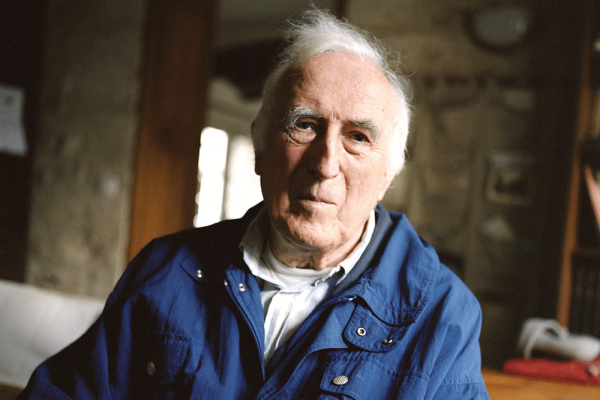A report released today concluded that Jean Vanier — a Catholic lay leader and founder of L’Arche, a worldwide network of communities supporting adults with intellectual disabilities — founded the first L’Arche community primarily as a cover for a secretive religious sect with exploitative “mystical-sexual” beliefs and practices.
The report also found Vanier sexually exploited at least 25 nondisabled women from 1952 until just before his death in 2019, far more than previously known.
According to the report, the sect used L’Arche as a “screen” to secretly reunite around their leader, Thomas Philippe, a Dominican priest who had previously been investigated and disciplined by Catholic authorities for his abuse and his manipulative theology.
Tina Bovermann, national leader and executive director of L’Arche USA and a member of L’Arche’s international leadership team, told Sojourners the new report offered a “heavy” look at the “insidious … and strategic” behavior of Vanier, Philippe, and other disciples of Philippe.
These disciples, the report finds, were a “sectarian nucleus” that formed a “microsystem at the heart” of the first L’Arche community in Trosly-Breuil, France. Vanier and Philippe’s abuse included “spiritual deviation, manipulation, incestuous representations of relationships between Jesus and Mary.”
“On behalf of L’Arche in the United States, I condemn, strongly and without any reservation, the insidious grooming, the psychological and spiritual exploitation, the intentional use and abuse of power, the sexual violence, the lies, manipulation, and deceit by which Mr. Vanier and Mr. Philippe caused hurt and harm to their victims,” Bovermann said in a statement accompanying the report. “We were not able to prevent, identify or report the abuses, and, consequently, we were not able to stop them. We offer our heartfelt and sincere apologies for the suffering that these situations created.”
New findings in the report
The 873-page report, compiled over the span of two years by six French scholars, was commissioned by L’Arche International in 2020 to better understand the organization’s founding and its figurehead, Vanier. This follows a previous report, released by L’Arche International in 2020, that delivered news Vanier had been credibly accused of sexual abuse by six women and lied about his knowledge of abuse by Philippe.
In the new report, the scholars identify key questions including: the extent of the abuse committed by Vanier and Philippe; the mechanisms of abuse and control they employed; how the sect maintained itself for nearly 80 years without detection; and whether the influence of the sect spread throughout L’Arche.
Their findings expose a much wider scale for Vanier’s abuse and lies than was previously known: While not all 25 nondisabled women described their experience as “abuse,” Bovermann told Sojourners “all of the women qualify their experience on some continuum of control, transgression, all the way to abuse.”
The 2023 report also challenges the founding story Vanier often told — that he started L’Arche after hearing a “cry” from God and seeing the inhumane living conditions in mental institutions.
“Contrary to what is said about the founding of L’Arche, there is no ‘revelation’, no cry heard, no vocational call defining the founding moment,” according to the report. While the report finds that the sect’s desire to better the living conditions of people with intellectual disabilities was sincere, the “primary intention … was to gather around [Thomas] Philippe.”
Since that first community was founded in 1964, L’Arche has grown to a network of nearly 150 communities in at least 35 countries around the world. In each community, people with intellectual disabilities and people without disabilities live together, and L’Arche has been a critical voice in the deinstitutionalization of people with intellectual disabilities.
The report did not find evidence that Vanier or Philippe abused L’Arche members with intellectual disabilities nor did it find evidence that the sect’s beliefs spread widely within L’Arche. The report’s conclusion states that “while the original sectarian nucleus did indeed form a microsystem at the heart of L’Arche, in light of the facts of abuse identified by the commission, it did not seem to have developed beyond the parent house of Trosly-Breuil.”
Thomas Philippe and l’Eau Vive
The report carefully examined the history of l’Eau Vive, a center Philippe founded outside of Paris in 1946 that offered training in the contemplative life and the theology of Thomas Aquinas. In 1950, after serving in both the Canadian and English navies, Vanier joined l’Eau Vive; he was 22.
The new report reveals that within l’Eau Vive, Vanier and others became students of Philippe and were “initiated” into Philippe’s perverse sexual practices.
In 1956, Philippe was investigated and barred from ministry by the Catholic Church after two women reported Philippe’s sexual abuse to his superiors. The 2020 report outlined how church officials disbanded l’Eau Vive and gave its remaining members “definitive prohibition of its reformation in another place.”
Yet letters excerpted in the 2020 report show Vanier maintained contact with Philippe and even helped Philippe “meet clandestinely with the women of Eau Vive,” despite being informed by church officials that they condemned Philippe’s theology and Vanier should not participate in any activities of l’Eau Vive. The new report further confirmed that Vanier and others were following Philippe’s instructions from 1956 through the founding of L’Arche in 1964.
Throughout the early days of L’Arche, Philippe was a spiritual adviser to the community. He died in 1993.
In June 2014, L’Arche learned of accusations against Philippe that occurred after L’Arche was founded. A subsequent investigation by the Catholic church found “Philippe was the perpetrator of abusive sexual behaviour towards adult women.”
Until his death, Vanier publicly denied knowing the extent of Philippe’s actions.
How the report was compiled
The six scholars who wrote the report are experts in history, sociology, psychiatry, psychoanalysis, religion, and theology. L’Arche International, which is headquartered in Paris, selected the scholars and financed their research but allowed them to work independently and draw their own conclusions. The report was written in French and has been fully translated into English.
In their introduction, the scholars write that they conducted more than 200 hours of interviews during 119 sessions with 89 people.
“[Interviewees] include people who could be considered victims of abusive relationships on the part of Jean Vanier, Thomas Philippe or other initiates of the ‘mystical-sexual’ beliefs and practices of the sectarian nucleus whose history the report describes,” according to the website introducing the report. “[They] also include witnesses to the history of L’Arche, particularly in the community to which Jean Vanier and Thomas Philippe belonged in Trosly-Breuil; and people close to Jean Vanier; or members of L’Arche who have held positions of responsibility.”
Claire Vincent-Mory, a sociologist at the Centre for European Studies and Comparative Politics and member of the six-person commission, responded to Sojourners’ questions by email on behalf of the commission. Vincent-Mory said “exploring such a painful and complicated history did not leave any of us unscathed.”
Despite the challenges posed by the pandemic and difficulty of carefully and respectfully interviewing victims/survivors and witnesses, Vincent-Mory said they were able to fully fulfill their research “thanks to the support and trust of a number of persons.”
“To our surprise, we faced no major or significant obstacles insofar as we had access to a large number of unpublished archives (we got access to all archive centers including Church and Holy Office), as well as to numerous testimonies, including from persons self-identifying as victims or survivors,” she wrote.
Vincent-Mory said the French academics were unhindered in their efforts to gain access to the archives of the Dominicans, the Catholic Church, and Vanier’s personal records. Bovermann told Sojourners that L’Arche had been denied access to the archives of the Dominicans and the canonical inquiry into Philippe until the summer of 2019, after Vanier’s death.
What the commissioned scholars found in the archives “stunned” leaders of L’Arche.
“Not only were the allegations [of abuse against Vanier] credible, which we had thought all along that that might well be the case … But there was this larger story of the sectarian group that [Vanier] was part of. And clearly [the report] proved that [Vanier] had lied,” Bovermann said. “It took the whole thing to a whole different dimension that I don't think any of us would've anticipated.”
The influence of the sect today
While acknowledging that there is often a slow process for victims of abuse to come forward, the commission wrote that the last known abusive relationship began in the mid-2000s, “a sign of an exhaustion of the capacity for renewal of the sectarian core.”
A key reason this sect did not take greater hold throughout L’Arche is that this sect was “numerically small” and, in L’Arche’s early days, “quickly joined and overtaken by the arrival of a large number of people who were completely foreign to it and who, in turn, assumed the foundation project with different intuitions and values,” the report explains. By nature of L'Arche's work serving people with intellectual disabilities, the original sect was connected to — and inadvertently partially held accountable by — the state, outside funders, and medical services; this kept the influence of the sect from spreading.
The report identifies a “small group of those who are suspected of still adhering to the mystical-sexual beliefs of T. Philippe,” but notes this group has “a weak capacity for influence.” Rev. Matt Hackworth, director of communications for L’Arche USA, told Sojourners that the investigation did not uncover anyone still associated with L’Arche who is suspected of adhering to the sect’s beliefs.
Ultimately, the report concludes L’Arche’s willingness to learn the truth is a strong indication that this sect and its teachings have been “exhausted” and the organization is undergoing a process of “individual and collective awareness” about the abuse that took place in its midst: “The resolution of the international leaders of L'Arche to request a multidisciplinary commission to study these facts is a final sign that reflects the progress of this process.”
In an open letter addressed to friends and partners of L’Arche, Bovermann commended the courage of the women who came forward and noted that L’Arche International has joined an “independent commission … set up by the French Catholic Church to receive and treat reparation requests for abuse committed by clerics or lay people.”
L’Arche has also offered a restorative justice process to any of the women abused by Vanier or Philippe. Hackworth said anyone with a claim of abuse or a concern about what L’Arche is doing to protect those involved with the organization can visit L’Arche’s website: larcheusa.org/about/safeguarding.
“Our first and foremost responsibility is to do right by these women,” Bovermann told Sojourners. “Have we always done well? Have we not made mistakes? No. No. But the North Star here is truth-telling, so that we can make amends, so that they can feel heard and can close the loops.”
Jenna Barnett and Betsy Shirley also contributed to this report. For more on Vanier and L’Arche, subscribe to the Sojourners podcast Lead Us Not.
If you or someone you know has experienced sexual violence, free confidential help is available 24/7 by calling 800.656.HOPE (4673) or visiting online.rainn.org.
Editor’s note: This piece was updated on Feb. 6 to correct the length of the English version of the report. The English report is 873 pages, not 868.
Got something to say about what you're reading? We value your feedback!






